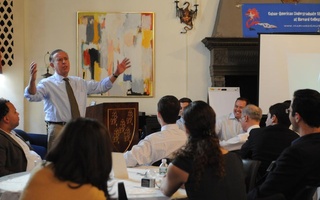Every few months or so, fresh evidence corroborating that Fidel Castro is alive surfaces, fueling endless rumors about his health and supposedly imminent death. Only recently, the Cuban leader published a newspaper article ironically called “Fidel is Dying” to prove he’s still alive. He long ago ceased to be a relevant political actor on the international stage, yet he has passed into a higher pantheon—that of the legendary. He’s certainly one of the most important Latin American leaders of the past century, and were the communist regime in Cuba to die along with Castro, his name certainly would not.
The Cuban Revolution has had a lasting influence on Latin America. The Cuban regime in the present day has very little. From the triumph of the revolution to the present day, and especially since the end of the Cold War, the ability of the Cuban regime to influence events in the rest of the region has waned dramatically. Yet, illogically, United States policy towards the island has barely changed. By continuing to impose an economic embargo in an attempt to isolate Cuba, the United States does nothing to further its long-term goals and causes only harm.
The embargo against Cuba has acute humanitarian repercussions that seriously erode the United States’ moral standing in Latin America. The Cuban government has complained before the United Nations that it is unable to complete purchases of equipment for treating cancer in children, since the prostheses it requires are sold largely by U.S. companies. The availability of antibiotics for infants on the islands has likewise been jeopardized. These are not one-sided, propagandistic protests: the United Nations Children’s Fund agrees that the embargo has resulted in limited cancer treatment options in Cuba.
Proponents of the embargo will reply that some civilian suffering as a result of the policy is inevitable collateral damage and point to the human rights abuses of the Cuban government itself. Those abuses exist, and they are unquestionably grave. The Castro regime imprisons political dissidents, curbs free speech, and exerts tight-fisted control on the political system.
But if the United States is going to encourage regime change for humanitarian reasons, perhaps it ought to take a closer look at some of its own allies. Cuba does not sentence women to be lashed by a whip if they drive, as occurred in Saudi Arabia last year. Cuba does not imprison young, mentally deficient girls for alleged blasphemy, as has Pakistan. How about China, one of our biggest trading partners? The political system there continues to be at least as repressive as Cuba’s, yet U.S. companies show little moral qualms about trading with the Asian giant.
Seen in this light, the embargo against Cuba is both illogical and arbitrary. Suppose, however, that Cuba does deserve to be singled out for special punishment—that the Castros are every bit the monstrous caricatures they’re made out to be and that they should be chased out of Havana on a rail at the earliest possible moment. Even so, the U.S. embargo simply does not seem to be working. More than two decades after the Berlin Wall fell, Havana still stands. If the embargo has not managed to spur regime change in that time, there’s little reason to believe it will achieve results anytime soon. The longevity of this ineffective policy is almost as impressive as that of Fidel Castro (and the Central Intelligence Agency has reportedly tried to do away with him in over 600 different ways).
Castro critics will claim that the Cuban regime serves as the lynchpin and ideological rallying point of an anti-American alliance consolidating in the Americas. This axis includes governments such as that of Hugo Chavez in Venezuela, Rafael Correa in Ecuador, and Daniel Ortega in Nicaragua. The truth is, however, that Cuba played no role in bringing any of these socialist governments to power. They were elected due to dynamics specific to each country and a continent-wide dissatisfaction with traditional political leaders.
Cuba’s relationship with these governments is based on genuine opportunities for cooperation, not joint anti-American sentiment. Venezuela, for instance, sends cheap oil to the island in exchange for a supply of doctors. That’s not an ideologically motivated transaction; if anything, it’s one based on supply and demand. Such partnerships are no justification for sustaining the embargo.
Earlier this year, the United States and Cuba drew swords in an acrimonious dispute over who owned the rights to the Havana Club rum trademark. Instead of fighting over it, why not sit down and share a drink? The two countries might discover that they don’t have very many valid reasons to be enemies anymore. Political change in Cuba will come in due time. But until the U.S. unilaterally renounces its senseless embargo, there’s little chance for reconciliation.
Jorge A. Araya ’14, a Crimson editorial executive, is an economics concentrator in Dunster House. His column appears on alternate Mondays.
Read more in Opinion
Vote for More GridlockRecommended Articles
-
Beyond the Embargo: Cuban ArtExhibition of prints exposes difficulties, talents of Cuban artists
-
Castro’s Chance to ChangeCastro has seemingly reinvented himself as an old, ailing man with new, healthy opinions
-
 First Harvard Cuban-American Alumni Conference Convenes
First Harvard Cuban-American Alumni Conference Convenes -
HRO's Cuban SummerUnder Maestro Cortese, HRO advances plans for their new performance tour
-
A First Course in CubaWhen the check came, Carlota started to say something to me, which I didn’t fully hear, or maybe just didn’t understand. All I heard was—"para nosotros." For us.
-
Cuban Music Sends A MessageMusic is giving voice to minorities and the poor in Cuba, according to Nora Gámez Torres, a doctoral student at the Department of Sociology at City University in London.













